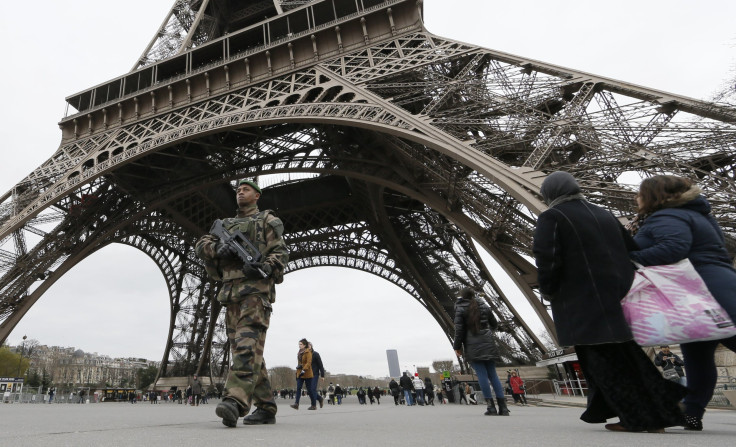Why Paris Is Calling The Charlie Hebdo Attack ‘France’s 9/11’

PARIS -- More than a week after days of violence in Paris, a once-unthinkable shadow has engulfed the City of Lights. Its name is whispered by workers huddled over rickety tables in dimly lit cafes, among professionals sharing wine on terraces, between strangers in line at their nearest boulangerie: war.
“In France, we’ve never known war. But terrorism, it’s a war,” said Jabu, a taxi driver of Algerian descent who asked to be identified only by his first name.
As Jabu drove through a part of Paris that is home to many Muslims, he turned and said, “The people here are scared. They feel it’s a bit like post-9/11.”
Many in Paris believe the attacks at the Charlie Hebdo satirical magazine and the kosher Hyper Cacher supermarket that left 17 victims dead and sparked an international outcry are indeed France’s 9/11. Of course, the scale of the losses cannot be compared to the nearly 3,000 U.S. fatalities. But as 9/11 was for the U.S., last week's attacks in Paris were al Qaeda's and the Islamic State group’s first formal declaration of war against Europe -- and specifically France.
“You come home, you make dinner, you always see the same images of war that I’ve never been through. When I heard what happened in Paris, my heart fell to my stomach,” said Flore Bonaventura, a 26-year-old comedian who lives in the city. “The shots fired at Charlie, they made me feel the shots fired around the world. It made me realize that the world is tearing itself apart everywhere. It's become something real for me.”
In the aftermath of Sept. 11, 2001, the U.S. launched its "war on terror" that led to the invasions of Afghanistan and Iraq. The attack put a face on terrorism for many Americans and brought distant conflicts into their homes. Now, for the first time for many Parisians, France is on the brink of following in America's footsteps.
“It is a war against terrorism, against jihadism, against radical Islam, against everything that is aimed at breaking fraternity, freedom, solidarity,” Prime Minister Manuel Valls said Saturday in a speech south of Paris.
On Wednesday, al Qaeda and the Islamic State group, also known as ISIS, underscored Valls' words by releasing videos mobilizing supporters within France’s borders to further terrorize the country.
France has been an active member of the U.S-led coalition against ISIS in Syria and Iraq, which has been largely aimed at preventing the militant group from coming to the West. Now, the country must launch its own “war on terror,” both internally and externally.
A phrase repeated in Paris since the attacks has been the problem of “les amalgames,” which loosely translates to a person who intentionally perpetuates discrimination -- racists. In Paris, the fear is that the attacks will increase the number of Islamic extremists who are ready to resort to violence.
This has been evident in the Je Suis Charlie ("I am Charlie") campaign that swept France and much of the Western world. Muslims who were offended by the publication's cartoons -- and thus did not embrace "Je Suis Charlie" as a banner -- were confused with those who actually support last week's massacre. Many Muslims now feel that freedom of expression is not a possibility for their community, especially after Wednesday’s arrest of French comedian Dieudonné M’bala M’bala for a Facebook post French authorities deemed supportive of terrorism.
“I didn’t like what happened as that action wasn’t Islamic, what Coulibaly and the two brothers did,” said Ibrahim, a security officer at Charles de Gaulle Airport who asked that his last name not be published. “But now I don’t understand when France has a law that is zero tolerance on religion, but on the other hand is targeting Muslims and provoking them.”
When France passed a law in 2004 banning religious symbols of any kind in public schools, Assembly Speaker Jean-Louis Debre said it was the "clear affirmation that public school is a place for learning and not for militant activity or proselytism.” In a 2013 poll from regional daily Ouest-France, 84 percent of French people wanted to ban the Islamic veil in private workplaces where employees had frequent interaction with the public.
“We’re free to practice whatever religion we want. The problem is in people’s heads, not with freedom,” said Leslie Mariette, a 26-year-old educator. “We’re free to do what we want at home, but we need to learn to keep that for ourselves. Religion is to be kept personal.”
Terror groups thrive in areas where there are deep divisions between communities and one community feels constantly oppressed by a dominant community. France’s Muslim population has long felt slighted, but the situation now has worsened. Since the attack at Charlie Hebdo there have been more than 50 anti-Muslim attacks in France.
“It’s very complicated. We’re talking about thousands of dead at 9/11 and 17 dead [in Paris last week]," Bonaventura said. "But they went into a room where there were people who were there to write about the world, about peace using humor. No matter what country you’re in, there is humor. Irony on all things is what gives us peace because if we can’t laugh about the world, the world is over.”
© Copyright IBTimes 2024. All rights reserved.





















